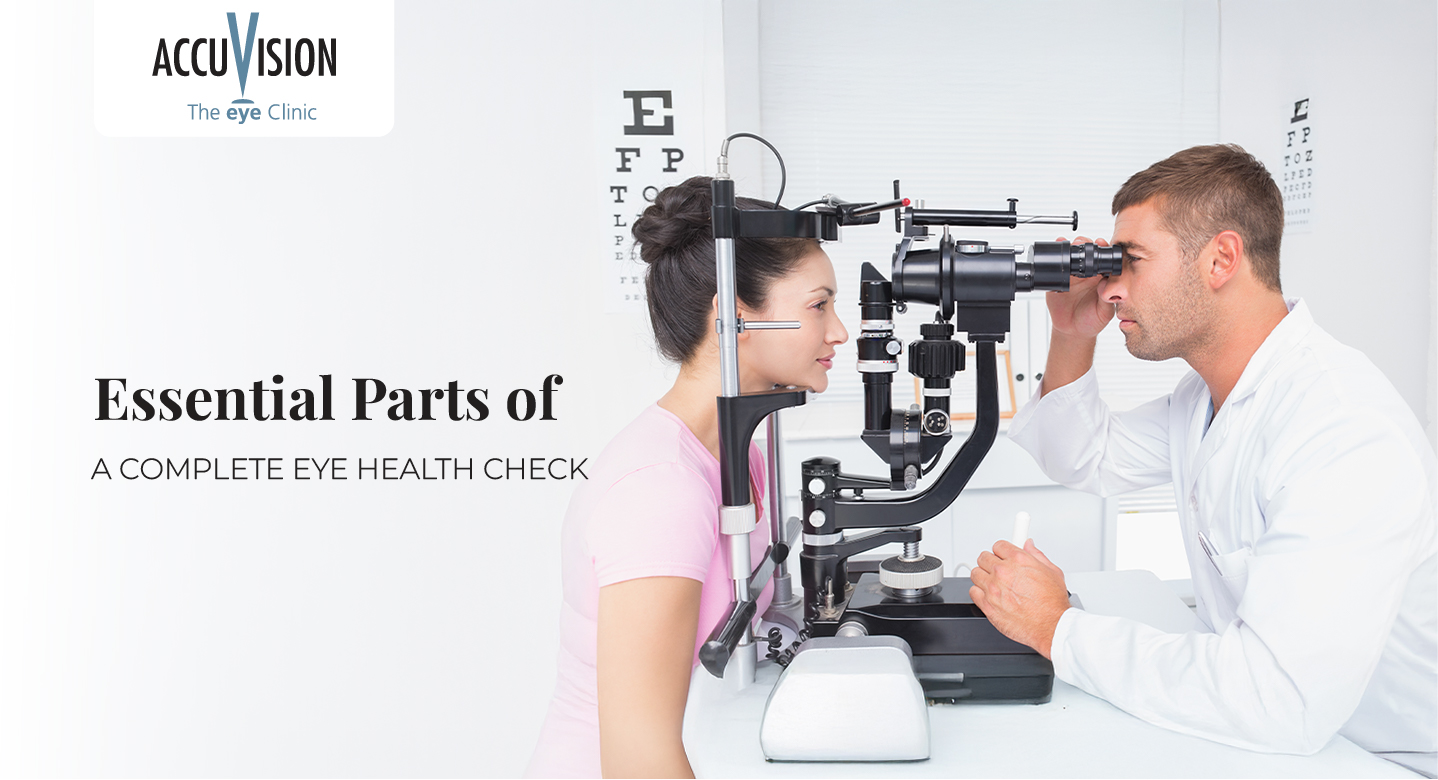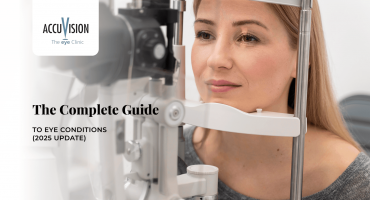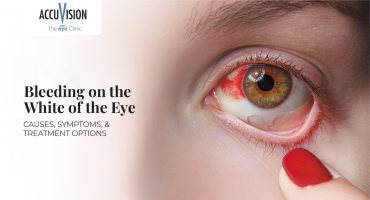- Why a Complete Eye Health Check Matters
- The 5 Essential Parts of a Complete Eye Health Check
- How Often Should You Have an Eye Health Check:
- Why Choose AccuVision for Comprehensive Eye Exams?
- Conclusion
- Frequently Asked Questions (FAQs)
5 Essential Parts of a Complete Eye Health Check

Eye health is far more than just vision correction, it’s about detecting silent, sight-threatening conditions before they cause irreversible damage. Many serious eye diseases, including glaucoma, age-related macular degeneration (AMD), cataracts, and diabetic retinopathy, develop without obvious symptoms in their early stages. This is why understanding what happens during an eye health check is crucial for protecting your vision and overall health.
The NHS recommends regular eye tests at least every two years for adults, with more frequent testing for those at higher risk. A proper comprehensive eye examination goes well beyond reading letters on a chart, it involves sophisticated testing procedures designed to assess every aspect of your eye health. At AccuVision, we understand that a thorough step by step eye test process in the UK can save your sight. Our comprehensive approach ensures that potential problems are identified early, when treatment is most effective.
Why a Complete Eye Health Check Matters
Many people underestimate the risks of skipping comprehensive eye examinations. The consequences of incomplete screening include:
- Unnoticed glaucoma progression (often called “the silent thief of sight”)
- Missed early signs of diabetic retinopathy
- Delayed detection of macular degeneration
- Overlooked systemic health conditions
Research shows that glaucoma affects approximately 1-2% of people in the UK over age 40, with many cases remaining undiagnosed until significant vision loss has occurred. Beyond detecting eye-specific conditions, comprehensive eye examinations can reveal systemic health issues. During detailed eye examination procedures, Optometrists can identify early signs of diabetes, hypertension, and even certain neurological conditions.
The NHS Diabetic Eye Screening Programme (NHS Diabetic Screening), which screens over 2.5 million people annually (Government Screening Statistics), has been instrumental in preventing diabetes-related blindness across the UK. This demonstrates how essential comprehensive eye care is not just for vision, but for overall health monitoring and early disease detection.
The 5 Essential Parts of a Complete Eye Health Check
A complete eye health check involves several advanced tests, not just reading letters on a chart. Here are the five essential parts of a comprehensive eye exam you should expect when preparing for any comprehensive examination:
1. Comprehensive Visual Assessment and Refraction
The foundation of any eye examination includes testing your visual acuity and determining if you need vision correction. This comprehensive assessment involves:
- Computerized vision testing systems
- Multiple distance testing methods
- Accurate prescription determination
- Astigmatism identification
- Binocular vision and specialized vision tests depending on patient needs
Modern practices use advanced refraction testing that goes beyond traditional letter charts. This step determines the precise prescription needed for glasses or contact lenses while identifying conditions that could affect your vision quality.
2. Intraocular Pressure Measurement and Glaucoma Screening
Given that glaucoma affects hundreds of thousands of UK residents, measuring intraocular pressure, examining the retina and OCT are critical components of comprehensive eye care. This essential screening includes:
- Traditional “air puff” testing methods
- Advanced goldmann applanation tonometry
- Optic nerve assessment
- Risk factor evaluation
- Early glaucoma detection protocols
High intraocular pressure is a significant risk factor for glaucoma, though the condition can also develop with normal pressure levels. This testing helps detect glaucoma in its early stages when treatment is most effective.
3. Retinal Examination and Digital Imaging
AMD is the leading cause of sight loss in the UK, affecting around 700,000 people. Advanced digital retinal imaging provides a detailed view of the back of your eye, enabling early detection and monitoring of conditions like AMD through a highly sophisticated assessment
- High-resolution retinal photography
- Macular examination
- Optic nerve evaluation
- Optical coherence tomography (OCT) scanning
- Cross-sectional retinal layer imaging
This technology can detect early signs of diabetic retinopathy, macular degeneration, and retinal tears that might not be visible through traditional examination methods alone.
4. Visual Field Testing
Visual field testing evaluates your peripheral vision and can identify blind spots or field defects that may signal underlying eye conditions before noticed symptomatically. This comprehensive testing includes:
- Automated perimetry programs
- Precise peripheral vision mapping
- Blind spot detection
- Glaucoma progression monitoring
- Neurological condition screening
5. Anterior Eye Health Assessment
The front structures of your eye require careful examination to detect various conditions. This detailed assessment examines:
- Corneal health and irregularities
- Iris structure and function
- Lens clarity and cataract formation
- Signs of dry eye syndrome
- Infection or allergy indicators
Using specialized lighting and magnification, Optometrists can identify early cataract formation, corneal disease, and other anterior segment problems affecting your eye comfort and vision quality.
How Often Should You Have an Eye Health Check:
NHS guidelines recommend specific testing frequencies based on individual circumstances:
- Most adults: Eye tests every 2 years
- Diabetic patients: Annual screening
- Family history of glaucoma: More frequent monitoring required
- Children: Regular testing at key developmental stages
- Existing eye conditions: Customised testing schedule directed by clinical signs and symptoms
If you are wondering how to prepare for an eye test in the UK, it’s helpful to bring any previous prescriptions, eye test reports, and a list of medications. Your Optometrist will advise on the appropriate schedule based on your personal circumstances and eye health status.
Why Choose AccuVision for Comprehensive Eye Exams?
At AccuVision, our team follows a detailed eye examination procedure in the UK to ensure early detection of any sight-threatening conditions. We combine cutting-edge technology with personalized care to deliver thorough eye health assessments that go far beyond standard sight tests. Our comprehensive service features include:
- Advanced OCT scanning technology
- Digital retinal imaging systems • Comprehensive visual field testing
- Experienced optometrists and ophthalmologists
- Personalized care plans
- Evidence-based testing protocols
We understand that each patient’s needs are unique, which is why we tailor our comprehensive examinations to your individual risk factors and health history. Our commitment to using the most advanced technology available means we can detect problems earlier and more accurately than traditional testing methods alone.
Conclusion
Comprehensive eye health checks are necessary for protecting both your vision and overall health. The five essential components, including visual assessment, pressure testing, retinal examination, visual field testing, and anterior eye assessment, work together to provide a complete picture of your eye health. Don’t wait until your vision problems become evident. Regular eye examinations can help identify serious conditions in their earliest and most treatable stages. Take charge of your eye health by booking a comprehensive examination today, your future vision relies on the care you receive now.
Frequently Asked Questions (FAQs)
1. How often should I have a comprehensive eye health check?
Most adults in the UK should have an eye test at least every two years, while those with diabetes, a family history of glaucoma, or existing eye conditions may need more frequent checks. Children and seniors may also require customized schedules based on age and risk factors.
2. What does a comprehensive eye health check include?
A thorough examination goes beyond reading letters on a chart. It typically includes visual assessment and refraction, intraocular pressure testing, retinal imaging, visual field testing, and anterior eye assessment to detect early signs of conditions like glaucoma, macular degeneration, or diabetic retinopathy.
3. Can eye tests detect other health issues?
Yes. Comprehensive eye exams can reveal systemic conditions such as diabetes, high blood pressure, and certain neurological disorders, allowing early intervention and improved overall health outcomes.
4. Are the tests painful or invasive?
No. Most eye health assessments are painless and non-invasive. Some tests, like glaucoma screening or retinal imaging, may involve brief bright lights or eye drops for pupil dilation, but these are routine and safe.
5. Why should I choose a private clinic like AccuVision over a standard eye test?
While high street eye tests usually provide essential screening, AccuVision uses advanced technology such as OCT scanning, digital retinal imaging, and detailed visual field analysis. This allows earlier detection of subtle changes, personalized care, and follow-up plans tailored to your individual risk profile.
References:
University Hospitals Sussex NHS Foundation Trust. (2023) Visual Fields Testing. Available at: https://www.uhsussex.nhs.uk/resources/visual-fields-testing-3/ (Accessed: 2 September 2025).
Shah, R. & Wormald, R. P. L. (2011) Glaucoma, BMJ Clinical Evidence, 2011:0703. Available at: https://pubmed.ncbi.nlm.nih.gov/21658300/ (Accessed: 2 September 2025).
NHS England (2024) Diabetic eye screening programme overview. Available at: https://www.gov.uk/guidance/diabetic-eye-screening-programme-overview (Accessed: 2 September 2025).
Public Health England (2014) Diabetes no longer leading cause of blindness thanks to screening. Available at: https://www.gov.uk/government/news/diabetes-no-longer-leading-cause-of-blindness-thanks-to-screening (Accessed: 2 September 2025).
Macular Society (2025) What is macular degeneration? Available at: https://www.macularsociety.org/macular-disease/macular-conditions/macular-degeneration/ (Accessed: 2 September 2025).








